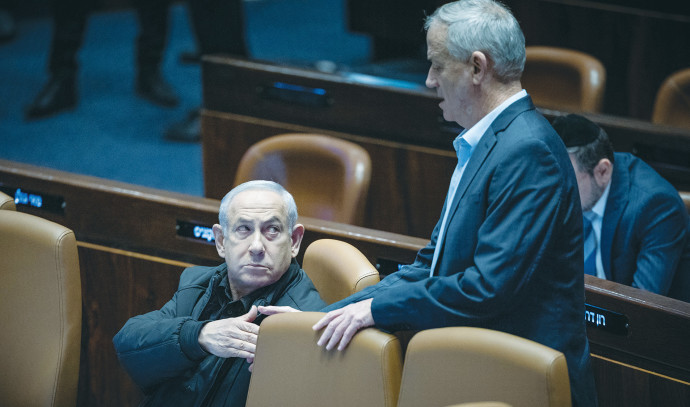Prime Minister Benjamin Netanyahu’s coalition dropped by four mandates while the opposition, minus the Hadash-Ta’al party has gained three mandates, according to a new Maariv poll.
The survey, conducted against the backdrop of the limited ground operation in Rafah, the situation in the north, the continued negotiations for a hostage deal, and US President Joe Biden’s warning to stop the supply of weapons to Israel, shows that the Likud party’s mandate number has dropped. Compared to the 21 mandates it garnered two weeks ago, the current poll shows the Likud received only 17.
Minister-without-portfolio Benny Gantz’s National Unity party gained one mandate, and for the first time in a while, the Labor Party has crossed the electoral threshold with 3.6%, which yields four mandates.
As such, the coalition has dropped three mandates to 47, while the opposition gained three mandates and now has a total of 64 according to latest figures.
Public shows pessimism regarding war
A different poll conducted by the Jewish People Policy Institute showed that about a third of the Jews in Israel are not convinced that Israel is the place where their children or grandchildren should live. The Institute identified a significant decrease in the sense of optimism of the Israeli public, both in relation to the state and in the personal sphere, accompanied by a decrease in confidence in Israel’s victory in the war.
37% of the public in Israel believe that the end of the war will be determined by the evacuees returning to their homes, compared to 17% who believe that the end will be determined by the return of the hostages to Israel. According to the findings of the survey, there is a significant decrease in the level of optimism in the Jewish public. The percentage of Jews who are very optimistic about the future of the State of Israel dropped from 48% in the previous index, conducted at the end of March, to 37%.
The survey also shows that 70% of the public has a low level of trust in the government. Trust in IDF commanders also dropped significantly from 75% in March to 59% in May. A large majority of 70% of the public believes that following the resignation of Maj.-Gen. Aharon Haliva, head of the Intelligence Unit, the IDF Chief of Staff Lt.-Gen. Herzi Halevi should also resign from his position.
“Unfortunately, the pessimistic findings reflect a reasonable reading of reality by the Israeli public,” assessed Prof. Yedidia Stern, president of the Jewish People Policy Institute, who warned: “In the last year and a half, cracks have appeared in the cohesion of Israeli society, in the sense of personal security, in the alliance with the United States and in the relationship to Jews around the world, and the Israelis are worried.”







